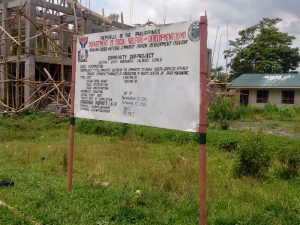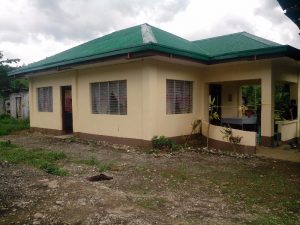By Thomas Rainier Gales, CDO II
 The road ends at Barangay Supanga, Calinog town. Beyond that, you have to go on foot.
The road ends at Barangay Supanga, Calinog town. Beyond that, you have to go on foot.
But with stamina and good deal of determination, a four-hour plod will bring you to Shangrila-like hidden valley blessed with a clear river providing fresh drinking water and fish. It’s a village called Barangay Marandig where they grow root crops and plantains and native rice that abounds in the cliffs and crags of the mountains surrounding the valley.
The place is abundant enough to sustain its inhabitants. But not if you’re sick or in dire need of medical assistance. The nearest health station was in Barangay Supanga. Thus, all who need medical attention, especially the women and children, have to climb up mountains to get medical help. We went there to answer the need.
MARICEL’S STORY
The local folks gladly welcomed us when we arrived. In one corner, I saw a young woman in her early twenties sitting in a corner- very timid but curious, her stare pure and innocent. I approached and told her I’m going to write her story. I told her I wanted I wanted to tell how women of Brgy. Marandig helped in shaping the lives of their kinsfolk.
She had been sitting already for three hours waiting for the operator to mill the rice they dried at the public basketball court. Her husband, Rene, on the other hand, was very busy warding off ducks and chicken that scattered rice all over the court. Along with the dogs, pigs roamed freely attracting flies wherever they go.
Maricel has two kids ages four and two. She said she left the kids over with a younger sister so that they could mill the rice for lunch. It was already around 11:30 in the morning. They needed to mill the rice right away to feed her family. Her home is at the other side of the river.
THE HEALTH CENTER: THEIR CAUSE OF JOY

Like most other couples in the village, Maricel and Rene married early. Rene is only 27 years old but surprisingly looked older than his age. He was smiling, his yellow teeth protruding, chewing betel nut and occasionally spitting the yellow juice as he prepared the dried rice for milling.I asked the couple how old their youngest kid is. Rene laughed and simply said, “indi pa ina ang amon nga agot, madugang pa kami walo (it is not yet our youngest, we plan to add 8 more).”
And that’s the hard truth. In this barangay, the average household has 7 to 8 members. They still believe that they need more children to ensure the survival of the clan/tribe.
For this reason alone, putting up a health center becomes even more imperative.
The construction of the facility is not only a cause of joy but a beacon of hope for the people who need medical attention. The facility is almost complete and the MHU agreed to send one health worker to stay overnight and attend closely to the health concerns of the community.
A DAUNTING TASK
Because Marandig Is so far from the nearest access road, the cost of goods become astronomical, often prohibitive. A sachet of 3-in-1 coffee for example cost only a few pesos in the lowlands. In Marandig, its price is equivalent to a cup of Starbucks capuccino.
Thus, there was the fear that the amount of grant for a health center may not be enough to build a new structure. Finding able-bodied men to carry these materials for hours and deliver to the site was another serious concern.
But adapting the traditional ways of the tribe proved more than equal to the challenges at hand. The Brgy. Captain led the community and his clan in decision and policy making. Through series of consultations, assemblies and gatherings over a bonfire, the community gave its commitment. Support the project was sealed by the bountiful feast. As a sign of allegiance, all abled men and women vowed do their part “pro bono” to finish the project.
UNBURDENED
As a 4Ps beneficiary, Maricel receives P1,600.00 allowance for her two kids. But she had to spend as much as P1,000 when she travels to get it. Maricel was very happy knowing that a health worker will regularly go down and visit their Barangay for monthly vaccination and check-up of her kids. This would lessen her burden of going up to Brgy. Supanga with her kids in tow. That would mean that she could spend more quality time with her family and attend to the needs of her kids.
After another hour wait, Maricel and Rene were able to get their milled rice from the operator who happened to be the Kagawad who also cooked for our food. Maricel went home with a hopeful heart that with our presence and the existence of a Health Facility will help her and all women in their area, providing the healthcare and protection that was deprived them for years.
LESSONS
The long walk to Bgy. Marandig may be tiring but it is not without its lessons. Along the way, we picked up a unique, fascinating custom. At every stopover, which is usually a small sari-sari store, the place provides a readily available jug of water and drinking glass. While taking shelter from the scorching heat of the sun, anybody can guzzle a glass to quench one’s thirst.
Also, people here are quicker to smile as they pass by along the way. It’s a simple gesture but it is one that touches deeply.
We always believed, that in the name of progress and development, our Indigenous People needs a lot of attention. True.But my experience in Brgy. Marandig tells a different story. These people may not have enough wealth and education but they are rich in gratitude and they value selflessness. These are the customs that we need to protect and value because in each of these pure hearts stores generosity that abounds with possibilities.
The story of Maricel and the struggles of the people of Brgy. Marandig gave me a new lens in looking at and addressing the needs of our Indigenous People. We learned a lot from them and as I went back to Poblacion, although wet from the rain and soaked in mud, I have with me the rich experience with the people of Brgy. Marandig. (Kalahi-CIDSS/DSWD)
